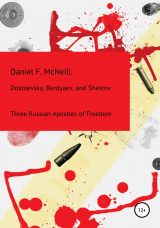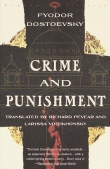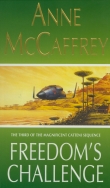
Текст книги "Dostoevsky, Berdyaev, and Shestov. Three Russian Apostles of Freedom"
Автор книги: Daniel McNeill
сообщить о нарушении
Текущая страница: 3 (всего у книги 5 страниц)
5
During a scene at Raskolnikov’s room between his friend, Razumihin, his sister Dounia, and his mother, Pulcheria Alexandrovna, Sonya opens the door and walks in. She has come to invite Raskolnikov to her father’s funeral and also to the dinner her stepmother is preparing that will take place after the burial. She is extremely embarrassed and her child-like “kindliness and simplicity in her expression” touches Raskolnikov. Sonya is also touched by him. He asks her for her address and promises to come to see her. Her appearance in the room of the murderer is angelic and something passes between the two that comes into Raskolnikov’s soul from a world that for him does not exist. She in turn feels a mysterious connection with Raskolnikov. “Never, never had she felt anything like this. Dimly and unconsciously a whole new world was opening before her.” When Raskolnikov comes to her residence later the same day, he has a long talk with the angelic Sonya and has a chance to enter this “whole new world” that has opened before Sonya. Something during this their second meeting attaches him permanently to her but something else prevents him from entering her world.
It is a main theme of Dostoevsky’s novels to bring characters struggling mightily with mental problems of various kinds to the point of belief. But most of them never make a magical leap of faith. What blocks them for the most part is an extreme reliance on the power of the mind although the influence of their mind does not completely explain their inability to reach the baptism that awaits them by a discovery of an independent, blessed power in their soul. Their isolation in their minds is strange, mysterious. An interesting way to understand the direction that Dostoevsky’s characters take is to compare them with the direction of Shakespeare’s Hamlet. Hamlet at the beginning of the play is an emotional mystic who talks to a ghost, the supposed spirit of his dead father who urges him from somewhere beyond the grave to avenge his murder by his brother. Hamlet is unable to rely sufficiently on this mystical revelation to avenge his dead father by murdering his uncle. In fact, he does not know certainly, objectively that his uncle has murdered his father until the third act. Finally, at the end of the play, Hamlet’s development leads him to rely solely on his rationality to direct him. “Readiness is all”, he announces in act five. Raskolnikov on the other hand is ready for all at the beginning of his drama and he never gives up his reliance on his reason. Hamlet’s youthful madness at the beginning of the play when he talks to a spirit develops to a sane reliance on reason to keep him ready to face the world realistically. Raskolnikov develops from an extreme reliance on reason to an insane reliance on it. His development should be from the rational to the mystical, the very opposite of Hamlet’s development, but, in the main body of his story, Dostoevsky will not allow him to go in that direction and discover the relief waiting for him in his soul. Raskolnikov’s rational aberrations from the normal use of reason will be repeated often in other characters in other Dostoevsky novels taking other forms, but it is always the same theme and the same judgment on their author’s part: an extreme reliance on reason alone becomes an insane aberration and drives a human completely away from any solace that can come to him from the soul. Sonya offers Raskolnikov during their interview a way to reach down into his soul and drink the gentle waters of his soul’s salvation but he does not go in the direction she offers.
In a dark room lit only by a candle, Sonya and Raskolnikov sit and talk. It is eleven at night. She is frightened by his unexpected visit at a late hour but happy to see him. He says that her stepmother, Katerina Ivanovna, used to beat her insinuating that the two have a bad relationship but Sonya explains that she loves her stepmother and that they are a close family. She expresses compassion for the sick woman with feeling as she speaks of the hardships of her life. Raskolnikov asks if she knew Lizaveta, the girl he murdered, and she answers that she did. As the talk goes on, he asks himself how she can live with such suffering, her own and her family’s. He paces up and down the room thinking for five minutes in silence. “His eyes were hard, feverish and piercing, his lips were twitching. All at once he bent down quickly and dropping to the ground, kissed her foot.” He explains that he has not bowed down to her but to “all the suffering of humanity”. He says after a few moments that “your worst sin is that you have destroyed and betrayed yourself for nothing”. He is now “almost in a frenzy”. “Tell me how this shame and degradation can exist in you side by side with other, opposite, holy feelings?” It appears that he is going in the direction of the soul. He can not resist trying to know how she can be such a good person and live such a foul life. He cried to himself, “How can she sit on the edge of the abyss of loathsomeness into which she is slipping…? Does she expect a miracle?”
“‘So you pray to God a great deal, Sonya?’ he asked her.
Sonya did not speak; he stood beside her waiting for an answer.
‘What should I be without god?’ she whispered rapidly, forcibly, glancing at him with suddenly flashing eyes, and squeezing his hand.
‘Ah, so that is it!’ he thought.
‘And what does God do for you?’ he asked, probing her further.
Sonya was silent for a long while, as though she could not answer. Her weak chest kept heaving with emotion.
‘Be silent! Don’t ask! You don’t deserve!’ she cried suddenly looking sternly and wrathfully at him.
‘That’s it, that’s it,’ he repeated to himself.
‘He does everything,’ she whispered quickly, looking down again.”
The conflict is the same throughout most of Dostoevsky’s works. It fascinates him to put side by side the angelic opposite the unholy, the good opposite the loathsome, faith opposite unbelief, the mystical opposite the rational. Usually there is somewhere a hint of a divine and miraculous world that flashes light very dimly towards his characters, a light that never quite reaches most of them, that never becomes a bright flash into their soul that might save them. Sonya is clearly an angel despite her profession and Raskolnikov is clearly a devil supported by the unrelenting power of the mind. They meet in a dark room lit only by a candle. Sonya’s soul is bright with love. Raskolnikov’s soul is a dark abyss and his mind a solid bridge above it.
Then a miracle takes place. Raskolnikov understands with his mind, objectively, that a secret divine presence is within Sonia. He accepts with his mind that God is alive within her protecting her even though he is unable or unwilling to jump across the gap between his mind and his soul, influenced by Sonya, to repent and to be saved. He asks himself, “What held her up – surely not depravity? All that infamy had obviously only touched her mechanically, not one drop of real depravity had penetrated to her heart; he saw that.” He noticed a book on the top of a chest of drawers as he paced up and down the room. He picks it up and sees that it is a copy of the New Testament. She reveals that Lizaveta, the murdered young woman, brought it to her. He asks her to read the story of Lazarus whom Jesus raised from the dead. She hardly dares to read it to him because she says he does not believe but he insists and she reads. “Raskolnikov saw in part why Sonya could not bring herself to read to him and the more he saw this, the more roughly and irritably he insisted on her doing so. He understood only too well how painful it was for her to betray and unveil all that was her own. He understood that these feelings really were her secret treasure, which she had kept perhaps for years, perhaps from childhood, while she lived with an unhappy father and a distracted stepmother crazed by grief, in the midst of starving children and unseemly abuse and reproaches.” He sees with the eyes of his mind inside Sonya’s soul. He sees miraculously without feeling anything miraculous that a miracle is the source of her life, a hidden source.
She reads the whole story of the raising of Lazarus from the dead. In the night, in the dark room lit just by a candle, the murderer watches a saintly young girl reading “distinctly and forcibly as though she were making a public confession of faith”. When she finishes her long reading, the two are silent in the dark room for five minutes. They have known one another since Marmeladov spoke of his daughter to Raskolnikov in the tavern saying passionately that her salvation is certain because she “has loved much” and they have been joined mysteriously since Sonya entered his room suddenly and angelically to invite him to attend her father’s burial and her stepmother’s reception, joined perhaps also when Sonya sent to him her stepsister Polenka with her childish love, and now joined forever because Raskolnikov has uncovered her secret strength, the divine love that lives in her soul, joined forever because now he has seen her faith as she read to him the story of Jesus raising Lazarus from death. But joined as they are they are also separated! It is a kind of miracle in reverse that Dostoevsky has invented. They are joined miraculously but at the same time they are adversaries. Raskolnikov will not move an inch from his imprisonment in his mind and believe. The truth is that he is so locked in the embrace of his mind that he is powerless to move to the other part of his being, the place where in Sonya’s being she lives truly. But Sonya will not move an inch either. She accepts him as the partner of her life forever but never does she accept his condition of unbelief. A silent war goes on between the soul of one and the mind of the other.
Breaking the five minute silence, Raskolnikov confesses to her that he has broken completely with his family. “‘I have only you now,’ he added. ‘Let us go together.…I’ve come to you, we are both accursed, let us go our way together!’”
“‘Go where?’ she asked in alarm and she involuntarily stepped back.” “‘How do I know? I only know it’s the same road, I know that and nothing more. It’s the same goal!’”
They go on talking feverishly back and forth, joined and separated, talking words that come from different centers of being. Sonya has read to him from the New Testament, read as a public confession the words of belief that Martha said to Jesus, words that she read as though they were her own and words that she read as though if Raskolnikov could say them as his own, his heart might open to love and he might believe. She said before him with religious feeling, “Yea, Lord: I believe that Thou art the Christ, the Son of God which should come into the world.”
But Raskolnikov will not say such words as his own. She asks him after talking much what is to be done.
“What’s to be done? Break what must be broken, once for all, that’s all, and take the suffering on oneself. What, you don’t understand? You’ll understand later…Freedom and power, and above all, power. Over all trembling creation and the antheap!…That’s the goal, remember that! That’s my farewell message.”
He is soon off away into the night after admitting to Sonya that he knows who murdered her friend Lizaveta and that if he comes back the next day, he will tell her who it is. But not for a moment does the idea enter her head that the murderer could be Raskolnikov. She is as extremely good in her thoughts as he is extremely bad in his.
He visits Sonya again at her room with the intention of confessing to her that he is the murderer of Lizaveta, her friend. But he is unable to confess the truth at once and instead tortures her with questions about who is worthy to live and who to die.
“‘You better say straight out what you want!’ Sonya cried in distress. ‘You are leading up to something again…Can you have come simply to torture me?’”
But he is still unable to speak the truth. He is in a kind of delirium. He leads up to the confession but does not confess. Finally he makes her guess the truth. She is shocked but abandoning him is as far from her mind as the awful truth is now solidly established in her mind.
“‘There is no one – no one in the whole world now so unhappy as you!’ she cried in a frenzy…” She begins weeping.
“A feeling long unfamiliar to him flooded his heart and softened it at once. He did not struggle against it. Two tears started into his eyes and hung on his eyelashes.
‘Then you won’t leave me, Sonya?’ he said, looking at her almost with hope.
‘No, no, never, nowhere!’ cried Sonya. ’I will follow you, I will follow you everywhere…’”
But for a few moments she can not believe he did it and asks him how it could have happened. He in turn has moments when he regrets letting her know the truth. She asks him to explain why he did it and he struggles to give her answers. She has touched his heart and brought tears to his eyes but he still is far from true redemption which is only possible if she can influence him to follow the feelings of his heart and discover the love that exists in his soul.
He goes into a long ramble to explain why he did it. “‘And you don’t suppose that I went into it headlong like a fool? I went into it like a wise man and that was just my destruction…I wanted to murder without casuistry, to murder for my own sake, for myself alone!…It wasn’t to help my mother I did the murder…I wanted to find out something else; it was something else led me on. I wanted to find out then and quickly whether I was a louse like everybody else or a man. Whether I can step over barriers or not, whether I dare stoop to pick up or not, whether I am a trembling creature or whether I have the right…’
‘To kill? Have the right to kill?’ Sonya clasped her hands.
‘Ach, Sonia!’ he cried irritably and seemed about to make some retort, but was contemptuously silent.”
Sonia argues that he must go to the police and confess his guilt. But he has doubts about doing what she wants because at bottom he does not believe he is guilty. He has done the murder so intentionally, so rationally that guilt is impossible and redemption and divine forgiveness just as impossible. Sonya haunts him, following him in his movements around Petersburg whenever she can. Dostoevsky thus reverses the usual kind of haunting. Instead of the devil haunting a good soul, a good soul haunts a devil. She will not leave him ever. When Raskolnikov enters the police station finally to confess, he has second thoughts and leaves the building. Outside he sees Sonya standing not far from the entrance, “pale and horror-stricken. She looked wildly at him. He stood still before her. There was a look of poignant agony, of despair, in her face. She clasped her hands. His lips worked in an ugly, meaningless smile. He stood still a moment, grinned and went back to the police office.”
At his trial he expresses no remorse or guilt for his crime. He is condemned to penal servitude in Siberia for eight years. Sonya follows him to Siberia and lives in a town near his prison. She lives only for him and does not bother him with thoughts about religion. Raskolnikov himself asks her after a year to lend him her copy of the New Testament. “It was the one from which she had read the raising of Lazarus to him.” But he does not take it up and start reading it right away. Its influence may be in his future but only his imprisonment is now sure and Sonya haunting him and waiting for him nearby with nothing to sustain her except her secret treasure.
6
A main character in Dostoevsky’s last novel, The Brothers Karamazov, Ivan Karamazov, says that if there is no God then we are free to do anything. The European existentialist philosophers took up this idea and held that all human acts must result from free choices since in a godless universe human being has no foundation. The French philosopher Jean-Paul Sartre went so far as to say that man is “condemned to be free”. Dostoevsky held that freedom must be the supreme human value, but instead of denying the existence of God in order to act freely like some existentialists, he reasoned that finding God is possible if we reach a state of spiritual and intellectual freedom. The groundless freedom Dostoevsky felt in himself inspired him to create any kind of character ready to think or to do anything at all. Logical thought and free will result in human choices that create a world where human behavior is forced to follow a premeditated pattern dictated by reason. The more man accepts to live a life ruled by his reason and a knowledge arrived at using the same logic used by scientists, the less able he is to discover the world within him of God’s divine grace which has nothing to do with reason and knowledge. God can control everything but he will not. He will not interfere with man’s freedom to do and think whatever he wants. For Dostoevsky grace is a divine gift, a secret treasure, but total freedom is also a divine gift, perhaps a more important one. God gives humans his divine grace freely but he can not give it or he will not give it to people who live enslaved by a rationalized intentional way of living. Dostoevsky’s rootless creations are enslaved by a power that does not originate in God.
Raskolnikov fascinates us because he appears free in a way that is far beyond normal freedom. But his thoughts are transitory and negative. They rise up but are soon gone replaced by new thoughts and new ideas. His freedom grounded in his mind leads him nowhere, to an unreal inhuman state. He ultimately reveals that he is a fiction, a self freely created uselessly by a mind based on nothing. Sonya is free because the cruelty and the injustice of the world force her to be free. Insults, suffering, loathsomeness do not allow her mind to create for her some comforting fictitious but practical self based on nothingness. Everything has been taken from Sonya. The hatred and cruelty around her in the world have stripped her of normal human falsity and forced her to retreat into her soul. Because she must give up everything, she finds everything. The meek and the suffering inherit the world because the powerful of the world despise them and crush them. The world forces Sonya to flee into the nothingness in her soul where she discovers miraculously a secret treasure.
Some of Dostoevsky’s other characters, like Sonya, give evidence of secret treasure within them but most of them are groundless, on their own, disconnected from the normal world and also from the world of God. He constructed characters from nothing and delighted in watching them try to assert their extreme individuality among regular, normal people. He created a comedy so divine that the more he created living beings from nothing, the more he became sure that God was helping him create them in order to show the world that nothing can ever be as vital as a divine presence in the human heart. For Dostoevsky life for humans must be free and without any foundation because there is a God.
7
In one of his early novels published in 1846, The Double, his hero Mr. Golyadkin, a minor government official, discovers the appearance of another Mr. Golyadkin, another being exactly like himself. At the beginning of the novel before his double appears, he consults a doctor because he feels mentally unbalanced. It is natural to think as his strange story develops that he loses his reason. In reality he never loses his reason and he becomes more and more unbalanced and delirious because he is horrified that he is losing not his reason but his self. His self appears to him in a form exactly like himself in every detail, as a living foreign himself exactly like himself. His double arrives on the scene and this other alien self that is also himself becomes more dominant in their relations with one another than himself. Reason is always able to guide us to some logical and practical end. We feel it is a necessary integral part of our normal behavior that helps us directly. But when our imagination runs wild for some unknown reason, when our emotions start going berserk and we appeal to our reason, we find that our reason is still present but is indifferent to our trouble and of no help. Mr. Golyadkin’s reason tells him with indifference that he is the real Mr. Golyadkin and that the other Mr. Golyadkin is also the real Mr. Golyadkin. Reason does not abandon the poor man at all and merely remains a useless presence in his mind indifferent to the delirious state of his feelings. As the other false Mr. Golyadkin becomes more and more dominant and as the reason of the real Mr. Golyadkin is without any power to distinguish between the two and establish who is real and who is unreal, the feelings of the original Mr. Golyadkin go more and more berserk as he begins doubting that he is in fact real. He is forced to enter a mental hospital. His double walks behind the carriage bringing the original Mr. Golyadkin to his new home and as he arrives there, disappears. Dostoevsky’s message is that Raskolnikov’s self, Mr. Golyadkin’s self, our selves may not be real. Our reason allows our imagination to create a self for ourselves and on our journey through life we must carefully keep presenting our invented self to others in a conventional package with few deviations. We feel comfortable with ourselves because other selves around us accept our invention of our self as real. Poor Mr. Golyadkin can not feel authentic facing his double’s invention of himself because it is in fact himself and only he should have the right to invent himself! By way of contrast, Sonya’s self is barely imaginable to herself. The self she constructed for herself naturally has been humiliated, crushed, destroyed. The world will no longer let her invent, it will only let her be. But normal being causes her suffering that is relieved only by the secret treasure she feels living in her heart. Unfortunately Raskolnikov and Mr. Golyadkin, who care nothing for the life of the heart, must rely only on themselves for strength and they discover that their inventions of themselves are not as reliable as they think.
The young Dostoevsky wrote The Double around the age of 25, two or three years before he received his second pair of eyes. As he stood before rifles pointed at him waiting for death, his reason at last allowed his imagination to abandon completely its duty to invent a self adapted to the selves of our world and let it go free to invent a self suitable to any world at all. A self for any world! But why not a self that did not fit in any world and that did not even need to make rational sense as a self? Bullets would fly at him in a few moments and when they arrived he would no longer have time or being or mind. The ground below his feet in seconds would no longer feel like ground. He would be timeless and groundless and his mind would no longer be able to pretend that rational forms of behavior were the only true basis of his true self.








